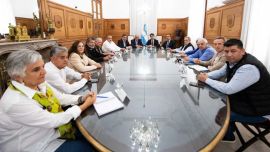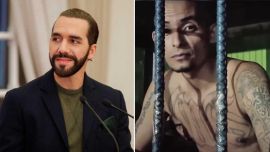The judge who has upended Brazilian politics with the sweeping Operation Lava Jato ("Car Wash") corruption investigation, Sergio Moro, accepted an offer Thursday from far-right President-Elect Jair Bolsonaro to be his justice minister.
Bolsonaro publicly offered him the post after being swept to the presidency Sunday on a wave of anti-establishment anger fueled partly by Moro's probe into the large-scale looting of state oil company Petrobras.
Moro flew to Rio de Janeiro on Thursday for a meeting with the hardline conservative. It ended with him accepting the offer to head a "super ministry" combining the justice and public security portfolios, both men said.
The move will likely fuel accusations that Moro's Lava Jato probe has been politically motivated and disproportionately targeted left-wing politicians – especially ex-president Luiz Inácio Lula da Silva, whom polls showed would have beaten Bolsonaro had he not been serving a 12-year corruption sentence.
"Federal judge Sergio Moro has accepted our invitation to be minister of justice and public security. His anti-corruption, anti-organised crime agenda and his respect for the constitution and the law will be our compass!" Bolsonaro tweeted.
Moro confirmed in a statement that he had "accepted the invitation as an honour."
"In practice, this will mean consolidating the advances we have made against crime and corruption in recent years and fending off the risk of a backslide, for the greater good," he said.
Corruption dragnet
Since it was launched in 2014, Moro's investigation has taken out a Who's Who of politicians and executives who colluded to pump billions of dollars from Petrobras into their own pockets or the coffers of their political parties.
Although politicians of all stripes have fallen, Moro has been accused of being particularly merciless on the left and members of the Workers' Party (PT) – especially Lula, Brazil's president from 2003 to 2010.
Moro sentenced Lula – a hugely divisive but enduringly popular figure – to jail for taking bribes from a Petrobras contractor.
Lula tried to stage a presidential come-back in this year's elections, but the courts barred his candidacy.
His substitute, former São Paulo mayor Fernando Haddad, lost to Bolsonaro in the run-off election, 55 percent to 45 percent.
In a country left polarised by the election, Bolsonaro and Moro are both divisive figures, too.
The president-elect has outraged many Brazilians with his derogatory remarks against women, gays and blacks, and his outspoken admiration for Brazil's brutal military dictatorship (1964-1985).
Moro meanwhile is a hero to some for his crusade against endemic graft – but condemned by others as a politically motivated opportunist who may have changed the destiny of Latin America's largest country.
Adding to the controversy, Brazil's Vice-President-Elect General Hamilton Mourão said Wednesday the offer to Moro was made "a while back" during the campaign, while the judge remained in charge of other corruption probes investigating members of the PT.
"[The invitation] has stood for a long time, during the campaign contact was made," added Mourão.
According to reports in the Brazilian press, the judge's wife, Rosangelia Moro, celebrated Bolsonaro's election last Sunday with a post on Instagram.
The image showed the famous Christ the Redeemer statue, a Brazilian flag and the number 17 – the one voters had to use on the ballot paper to select Bolsonaro as the next president. A caption reads: "Under new direction."
- TIMES/PERFIL/AP





















Comments